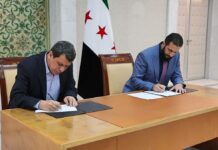
Turkish President Recep Tayyip Erdogan stated that Turkey has expressed a desire to meet with Bashar al-Assad in an effort to normalize relations between the two nations. However, no response has been received from the Assad regime, Erdogan said Saturday in a press conference at Ataturk Airport in Istanbul before departing for New York to attend the 79th session of the UN General Assembly.
“We have shown our desire to meet Bashar al-Assad in order to normalize relations, and we are now waiting for the other side’s response,” Erdogan told reporters, according to Anadolu Agency.
Erdogan emphasized that as two predominantly Muslim countries, Turkey and Syria should work toward unity and solidarity, hoping that a meeting could mark a new phase in bilateral relations. “We want to achieve this as soon as possible,” he said while acknowledging that it is difficult to predict a timeline for such a meeting.
Erdogan’s comments come as Turkish officials continue to outline a phased approach toward Assad normalization. Omer Celik, spokesman for Turkey’s ruling Justice and Development Party (AKP), explained in an earlier interview with Haber Turk that the process includes three stages. The initial stage involves intelligence services addressing security issues, followed by meetings between foreign and defense ministers, with the final step being the potential Erdogan-Assad meeting.
The push for normalization with Damascus has not been without domestic and regional challenges. Turkey’s ongoing support for various Syrian revolutionary and opposition factions, which control parts of northern Syria, has complicated the process. The leadership of the Turkish-backed and internationally recognized Syrian Negotiating Commission (SNC) recently expressed concerns about the proposed normalization.
Badr Jamous, SNC head, reportedly told Turkish officials that such efforts were “futile and absurd,” especially in light of the Assad regime’s history of violence and repression. Turkish encroachment faces internal challenges to Turkish-backed factions in northern Syria and increasing rejection from some revolutionary movements within Syria, which see normalization with Assad as a betrayal of the cause.
Erdogan’s government has framed normalization with Damascus as a way to address several pressing issues, including the presence of the Kurdistan Workers’ Party (PKK) in northeastern Syria and the ongoing refugee crisis. Turkey currently hosts more than three million Syrian refugees, and Erdogan’s administration hopes that improved relations with Assad could facilitate the return of these refugees.
Turkish Foreign Minister Hakan Fidan highlighted the significance of addressing the refugee issue, pointing out that the situation in northwestern Syria has prevented millions more from crossing into Turkey. He underscored that for any long-term solution to the migration crisis, Turkey and Syria must build a relationship of peace and trust. Fidan noted that the security environment in Syria remains precarious, with many Syrians in Turkish-controlled regions unwilling to return to areas governed by the Assad regime due to fears for their safety.
The Turkish president’s remarks about potential reconciliation with Assad come amid broader efforts to reduce tensions in the region. Erdogan, who will deliver a speech at the UN General Assembly, has called for an end to what he described as “state terrorism” and instability in Syria, emphasizing that “terrorist organizations” and foreign interventions, including by Israel, have worsened the conflict.
The possibility of an Erdogan-Assad meeting, if it materializes, would represent a significant shift in the regional dynamics after years of hostility between the two countries. However, as Erdogan continues to push for dialogue, it remains unclear when, or if, Damascus will agree to talks.








